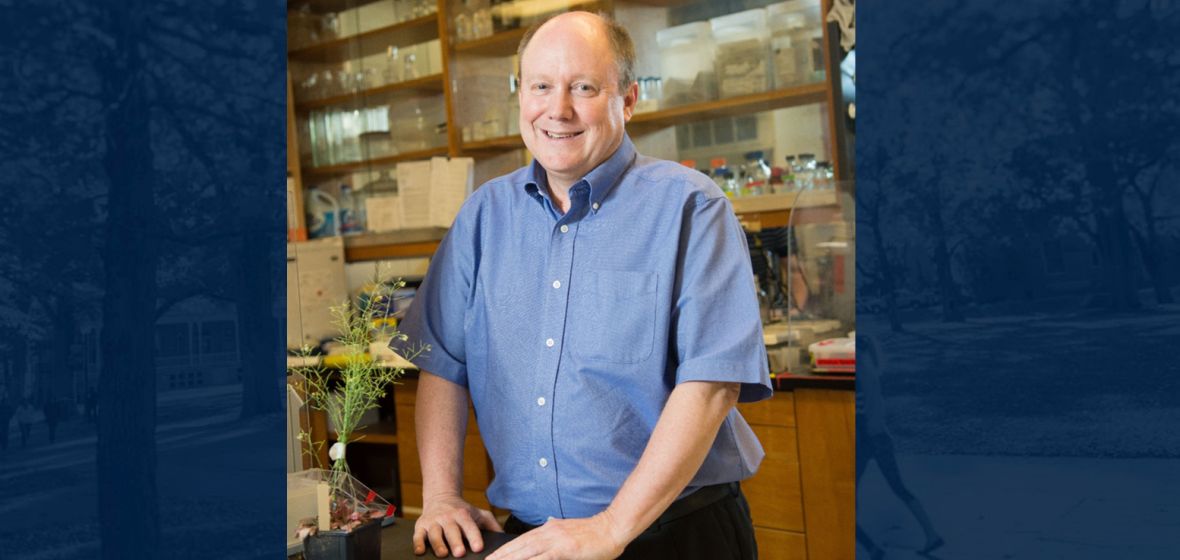In the face of climate uncertainty and worldwide population growth, Jeff Harper's research has become increasingly more relevant over time. The Foundation Research Professor in the College of Agriculture, Biotechnology and Natural Resources explores how the evolution and genetic makeup of plants allows them to develop and grow under extreme environmental conditions such as cold, heat, drought and salt stress.
Harper's research has significantly contributed to two different fields of plant biology, calcium signaling and ion transport, and to advancements in agricultural productivity and food security. His most recent published work, supported by the National Science Foundation, focuses on improving pollen fertility to address the development of higher yielding seed-crops with improved heat-stress tolerance.
Harper was named the University's Outstanding Researcher in 2018 for what his Department of Biochemistry and Molecular Biology colleagues, in their nomination of him, described as an "extraordinary research program." Now, Harper has received an important statewide recognition from the Nevada System of Higher Education Board of Regents: the 2019 Researcher Award-Distinguished Career."Our research goal is important if we are going to increase food production in the face of future climate uncertainties, or even just to maintain our current level of food production. The need is clearly there," he said. "Those of us who just get our food at the grocery store lose touch with just how hard it is to even sustain production."
His track record of research impact includes more than 100 peer-reviewed papers and more than 11,000 citations, yet when asked about his most meaningful discovery or publication, Harper said, "I haven't written that paper yet. It all leads to what do I do next."
Harper is not only looking into the future, he's looking into space.
"If we are going to colonize space we need to grow food in space," he said. "Science needs to explore how we start to engineer food production systems in space. We need to rethink things if we are to have plants that can live in zero gravity, reproduce in zero gravity, provide nutrition and vitamins. Evolution alone won't do this. It will take some creative rethinking about what we know on earth."
Just as the early space-travel programs resulted in new ideas, materials and technologies used on earth, Harper predicts the exploration of food production in space will result in better knowledge, systems, nutrition and food production yields here at home.
Harper, who was named the CABNR Teacher of the Year in 2013, exudes enthusiasm for science and exploration. One of his favorite mantras is "everybody is born a scientist."
"You can't separate teaching and research. In the creation of new knowledge everyone is exploring and teaching others about what they discovered," he said. "The lab's bigger picture goal is to learn and everyone that comes in contact with the lab comes in contact with the learning and discovery agenda."
If he can use the platform of having been named Nevada's Distinguished Career Researcher to impart a message, it is this: Putting resources into the education of students will make a difference to the world, and the more the better.
Harper is a faculty member in the Department of Biochemistry and Molecular Biology and in the Molecular Biosciences Graduate Program, an interdisciplinary collaboration between the College of Agriculture, Biotechnology and Natural Resources; College of Science; and University of Nevada, Reno School of Medicine.
"They are always impressive with their motivation, dreams and potential," he said of his students. "What I like about teaching is that I must continually learn. Teaching and working with students changes the things we do in the lab."
"I am so pleased to see Dr. Harper receive this award," Marc Johnson, University President, said. "He is an outstanding researcher and colleague, and he has made a lasting contribution to science both through his research and through his passion for developing future scientists."












